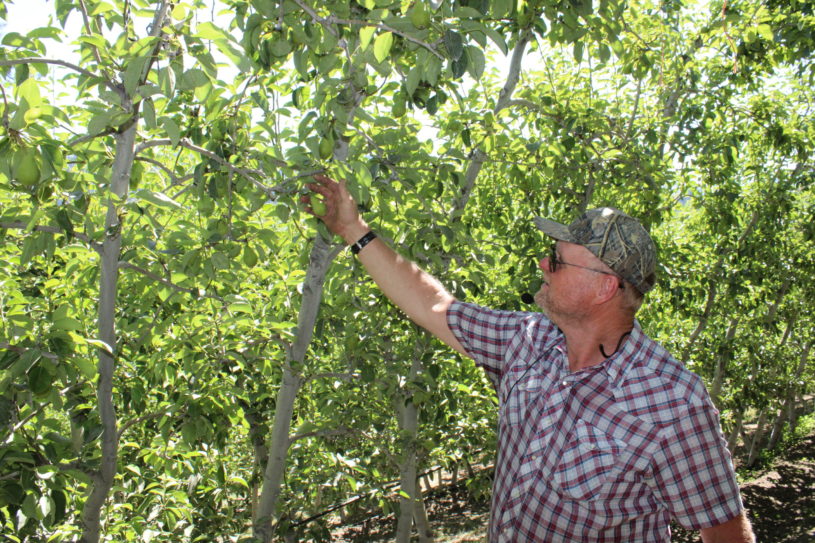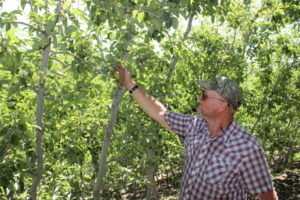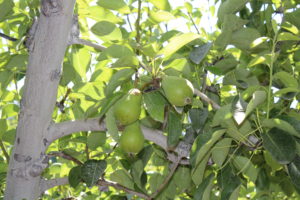
Jan 24, 2023
Prey’s Fruit Barn & Orchards carrying on family tradition
Organics are important for Prey’s Fruit Barn & Orchards. For nearly half a century, the Wenatchee Valley orchards have grown pears in elevations as high as 1,500 feet in Washington’s picturesque Cascade Mountains.
The valley’s warm days and cool nights shape pears better than other growing regions, said Rudy Prey Jr. The Leavenworth, Washington, orchardist grows green d’Anjous and green Bartletts and smaller volumes of Boscs as well as red Starkrimsons, red Bartletts, red d’Anjous and Concords on 75 acres, two-thirds of which are organic.

Prey began growing pears organically in 1992. He entered the sector in a small way, planting only a handful of acres. He quickly expanded, however, by planting a small block, then planting more.
At the turn of the century, Prey grew all his pears organically. That lasted a couple of years. “It became really difficult growing organically with the big, mature trees,” he said. “We had a hard time controlling insects. Production was going down.”
Prey removed those trees out of organics.
Growing organics means limited access to acceptable inputs. “There’s definitely a whole range of different products, some of which are very effective, while some only work OK,” Prey said.
As organic-approved sprays aren’t as available, weed control remains the biggest issue. Weeds must be controlled mechanically or manually.
Immigrant’s story
In 1975, Prey’s family immigrated to the Wenatchee Valley from West Germany. Prey’s father, Rudy Sr., who was in between career decisions at 41 years of age, was urged by his family members to consider moving to the U.S.
The older Prey’s sister and other family members were already living in California and Washington. They recommended he visit the Leavenworth area, a Bavarian town. Rudy Sr. and his wife fell in love with the valley.
Purchasing an existing pear orchard, the couple began harvesting shortly after arrival. Owning land was a way to prove the elder Prey could support himself in obtaining citizenship.
Because he was new to the industry and didn’t know anything about pear farming, Rudy Sr. had to educate himself, which gave him an advantage in that he wasn’t farming like his father and grandfather and was more amenable to new techniques, his son said.
The senior Prey planted modern high-density orchards. It gave the Preys some advantage as today’s orchards are struggling, mainly because of the industry’s reluctance to modernize, the younger Prey said.
Rudy Sr. died in 2003 at age 71.
In 1979, the Preys started a farm stand, adjacent to one of Prey’s older groves. The farm market sells apples, cherries, pears, peaches, nectarines, apricots and vegetables to hungry motorists. Prey said one of the market’s benefits is growers can show consumers what to look for and the best ways to ripen pears purchased in supermarkets.
After attending Spokane Community College and the tree fruit production program at Wenatchee Valley College, the younger Prey decided he wanted to learn more about real-world fruit production at an Oregon nursery and a New Zealand orchard, where he handled many tasks.
Uncertain organic future
Prey said he is debating whether he will continue growing organically.
“I’ve been on both sides of the spectrum,” he said. “As far as growing, I’ve had real success sometimes growing organically, sometimes not at all. It depends sometimes on the year. It can be difficult to keep your production as vigorous because you can’t use the same fertilizers as conventional. The cost of production is higher. We have had returns justify the costs.”

Mounting costs and the pear industry’s lack of clout to leverage crop protectants to battle insect pests have become major problems pressing grower profitability, Prey said. Because the comparatively small pear industry doesn’t garner much interest from crop protectant companies, growers are left with few options to battle pests and diseases.
When his father retired in 1996, Prey took over operations. While growing up in the family business during the late 1980s and 1990s, he purchased and leased his own orchards.
The experience in New Zealand, considered a leader in modern orchard production and techniques, showed Prey his family’s pear orchards should go higher-density, planting trees closer together for greater production and efficiency.
As opposed to farming on flat land, Prey’s varied topography with high-elevation orchards make pear farming more challenging. As pears prefer cooler temperatures, the elevation, however, helps with production.
“It’s important every part of an orchard is as productive as it can be,” Prey said. “You can’t farm every part of an orchard the same. Instead of farming by the acre, you have to almost farm it by the tree.”
Prey also works to ensure all trees are similar to neighboring trees in terms of health and vigor.
Organic demand has been disappointing, he said. “During the last several years, organic returns have been fairly low, while conventional returns have come up a little,” Prey said. “There’s not a big price difference anymore.”
Prey believes low grower returns will influence production. “There will be less organic production going forward,” he said. “Some growers just can’t make it.”
Despite the dwindling demand, Prey loves his work.
“The best part of farming for me is working outdoors,” he said. “All through the year, growers have different jobs, not doing the same thing every day. You need to have an outside job. I wouldn’t be one to sit behind a desk all day. I live in a beautiful area, not like the Midwest where there are thousands of acres of flat ground. There are many opportunities here. I also get to work in an area that’s also very nice to live.”






